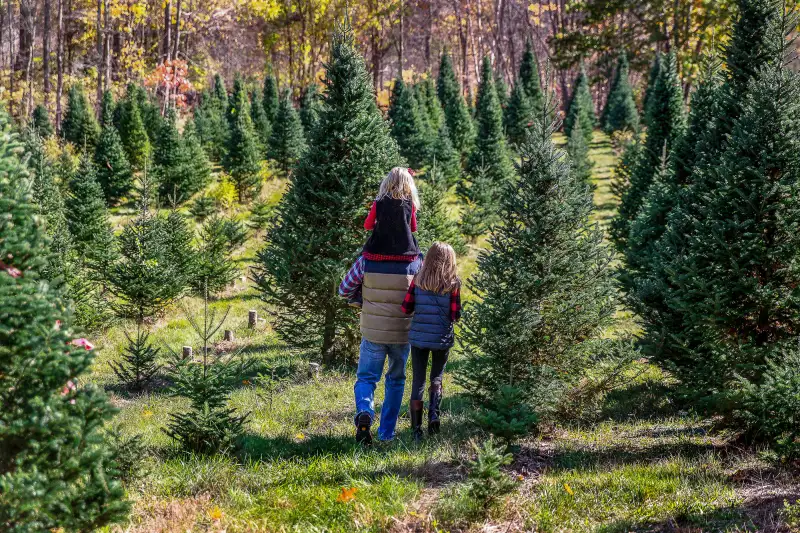These Are the Best Days to Buy a Christmas Tree, According to an Analysis of 200,000 Sales

For many Americans, a Christmas tree is a tradition. But when's the right moment to buy one? These can be fraught family decisions.
At Money we like to make make financial choices -- even small ones -- after studying all the relevant data. The good news is credit-card processing company Square, in partnership with National Christmas Tree Association, recently crunched the numbers on more than 200,000 tree sales from thousands of Christmas tree farms to show how prices fluctuate throughout the holiday season. Your best bet to maximize minimize price and maximize enjoyment time: Go the first weekend in December.
To be sure, it's a judgement call. Trees get steadily cheaper as you get closer to Christmas, meaning most of us will have to accept a trade-off between paying as little as possible and maximizing pre-Christmas tree time. But with a close to average price and 20-plus days of Christmas tree bliss, we think the first weekend offers the ideal balance for getting the most value out of your tree.
The First Weekend in December
The average price for trees on the first Saturday and Sunday in December is about $74. It's certainly not the cheapest price you can get, but the average price for the entire month-long Christmas tree season is $73 so you're not overpaying either. What's more these few days often offer a noticeable dip in price from the what's otherwise one of the more expensive times to buy, according to the Square report. Christmas tree sellers might be trying to entice families with deals, knowing that first weekend brings big crowds, theorizes the National Christmas Tree Association.
"Feel free to talk to the farm and see what kind of a deal you can work out," Tim O’Connor, executive director of the National Christmas Tree Association tells Money.
Despite paying an average price, you can enjoy your tree for three full weeks which gives you plenty of time to make the most of the holiday season. Of course, buying early means you come off as organized and avoid looking cheap, too. Americans seem to have figured this out instinctively. The first Saturday and Sunday in December are the two most popular single days to buy a tree in the U.S. -- although a majority of Americans buy sooner or wait until later.
The Second Weekend in December
Waiting until the second weekend of the month only leaves you with 15 days for tree enjoyment, and while you will save, it's only a few bucks. The average tree costs $70 to $73 during those two days. You may also have to spend more time looking for your tree, since a portion of the best ones will already be gone, according to Square. But since it's not the most popular weekend to buy, you can avoid the frustration of holiday crowds — which some people consider priceless. Pro tip: If you go on a weekday you can avoid the crowds almost entirely. Square's data shows that the number of people on the hunt for Christmas tree deals drops by the thousands during all weekdays compared to weekend days.
The Third Weekend
If you're especially frugal — and persuasive enough to convince your family they don’t need to post Instagram photos of your tree just yet — you can save up to 22% and score the same tree for anywhere from $68 to $59 if you hold off until the week before Christmas. And of course, if you wait until Christmas Eve you'll spend the least, with trees costing just on $47 on average, according to the report.
But even if your wallet is tight this season, you may want look for savings elsewhere. Even though the average tree is under $50 by Christmas Eve, you're really only saving about one dollar per day waiting until the last minute. And considering average Americans are expected to spend $1,007 on Christmas this year, it's a drop in the bucket. Plus, no matter where you look, you're likely to encounter less quality options than if you had made the trip to the Christmas tree farm earlier — the most desirable trees are no doubt taken by the time Santa's coming down the chimney.
The Early Birds
Ironically, those who do try to skimp out on the living embodiment of Christmas end up paying the most. As many as a quarter of Christmas tree shoppers buy their trees before December, during the biggest shopping weekend of the year, perhaps thinking they'll score a deal, but that's not the case. Black Friday and Cyber Monday are the two most expensive days to buy a tree, with average costs of $77 and $81, respectively, according to Square.
For the early birds, it may be worth shelling out a few extra bucks to have their pick of the best trees before the first Saturday rush clears out a chunk of inventory, O'Connor says. Those with serious Christmas spirit may be purposely seeking out the tallest, most spectacular tree they can find — and also don't mind paying a premium for it. And then there are those who may just be naive, assuming they're getting a good deal because it's the most-hyped shopping weekend of the year — but now you know better.